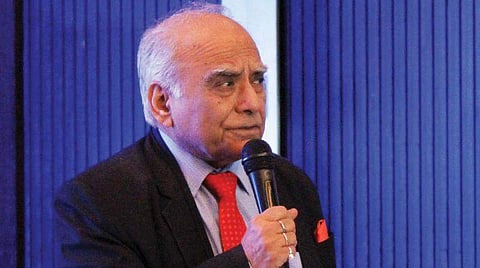

Even though India had developed a very good foundation of institutions that could tackle disasters like COVID-19, but they have lost their way, said Dr Nirmal Kumar Ganguly, Former Director-General, Indian Council of Medical Research (ICMR) while speaking at The New Indian Express' COVID Think Tank. He was in conversation with Senior Journalist and Author Kaveree Bamzai.
"I handled around 10 epidemics, one almost every year when I was with the ICMR. And whenever it hit us we got paralysed. We didn't do anything. During those times we thought we should build institutes that would protect us," said Dr Ganguly who was an integral part of setting up most of the institutions that are in place today. "One of the first things I was involved in was when I was with PGI Chandigarh. When the plague hit us, Dr Ramalingaswami called me and suggested that we go around and see if we could solve the problem. We fished out Dr Batra from the DRDO and we went around the country and realised that we need to strengthen the NCDC to the same extent as the CDC," he said and added that they went on to build some of the steller institutions in India to foster an ecosystem that would provide support in times of need.
But it did not go as planned. "We have lost our way somewhere. The institutes which were supposed to provide strength are not performing as well as they were supposed to," said Dr Ganguly. "We did everything right. We also created public health standards which also should have helped us. What we did not do is give them real autonomy as they have in other countries. They should have been able to come and do their work seamlessly. The other thing that we couldn't do very well was (increasing) the health budget. Our health budget has been very very poor for decades and it's poor even now. Major health expenditure comes from the private sector," he added.
India has an institution for every step of the way, said Dr Ganguly as he named the institutes who are responsible or supposed to be responsible for each of these steps. "One of the organisations important for surveillance and control is the Indian CDC, the one for the validation of the vaccines and diagnostics is the National Institute of Biologicals, for research the ICMR, for new drugs the Council of Scientific and Industrial Research, for creating industry-academia interactions the Department of Biotechnology, for basic research the DST, for environmental effects the Environment Ministry, for engineering the IITs and for on ground work the National Rural Health Authority along with link workers and the huger network of NGOs," he added.
While India has finally produced what it needed, it would have been much better if we had a stockpile, said the former DG of ICMR. "Coordination, timely production and distribution were some things which could have been planned by our disaster management boards and it would have fallen in place," he added. "Another thing is the supply chain management. Under the government, only two bodies do it well — the Army and the Red Cross. This is something we need to strengthen. We could have learnt from Amazon how to deliver items to the remotest places," he said, adding that India also suffers from a lack of manpower.
India needs to train doctors to work in the field and not just inside hospitals. added Dr Ganguly. "We should create a system, like Thailand or even China, where we will have trained manpower who will be trained to perform several functions on the field. The medical students now do not pay attention to courses like community medicine. They often bunk these classes. This is the manpower we need to harness. Especially nurses. They are the major workforce anywhere, not the doctors," said the doctor.
India has always been one of the vaccine manufacturing hubs but has also taken a long time to eradicate the same diseases, said Dr Ganguly. "We eradicated smallpox 25 years after the major forces eradicated it. We were producing vaccines for Hepatitis B but we took 25 years there as well. We have the products, we need to learn how to take that and reach the corners of the country," he said.
"We should prevent institutes from degrading and we should do their performance audit as well. In the US, all the bodies like CDC or NIH are under one governance system. Here we have separate organisations. There needs to be coordination between them. We were lucky this time that the minister for health and science and technology is the same and some coordination happened. But essentially, the entire government system needs to come under one seamless umbrella," he said. "We need better data analysis so that our planners can take the right decisions. Our data crunching was weak," he said and added that the intensity of the second wave might have been less if the data analysis was done better and they would have advised the government to take the right precautions.
